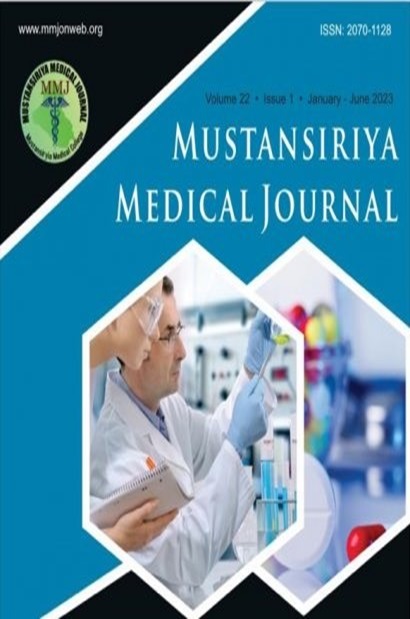Abstract
Background: Recently a new premixed insulin analogue has been introduced with good results achieved in
different parts of the world particularly regarding good glycemic control and safety.
Objective: This clinical study was conducted to evaluate the effectiveness and safety of introducing new
insulin (biphasic insulin aspart 70/30)for the treatment of type 2 diabetic patients.
Methods: This prospective follow up study included 68 type 2 diabetic patients who has been randomly
selected from those attending the National Diabetes Centre (NDC)of Almustansiria University during the
period between 1st of oct.2004 to 31st of march 2005.Each patient had been followed for an average period
of 6 months. Detailed history had been recorded and thorough physical examination has been performed for
each patient. Readings of fasting and postprandial plasma glucose (FPG,PPPG), HbA1c,body mass index
(BMI), and the frequency of hypoglycemic attacks had been recorded at the baseline ,interim, and the final
visit which had been separated by 3 months between each other. At the baseline visit , each patient has been
instructed how to use insulin pen properly and biphasic insulin aspart 70/30 had been supplied to the patients
included in this study freely. Statistical analysis using students t-test had been used to assess the difference
between different means using a p value of less than 0.05 as the level of statistical significance.
Results: This study showed that there was significant difference between the mean human insulin dose used
before the study(48.3u/day) and the mean premixed insulin Aspart(36.88u/day) P value less than 0.05.The
use of insulin analogue was associated with significant reduction in FPG (130.5mg/Dl in the last visit
,compared with 216mg/Dl in the 1st visit )P value less than 0.001,and the PPPG (160.2mg/Dl compared with
280mg/Dl in the 1st and last visit respectively)P value less than 0.001, and the mean HbA1c (7.1%
compared with 9.41%)P value less than 0.001.There was no significant difference between the 1st and last
visit recordings of BMI (27.9Kg/m2 compared with 28.1Kg/m2 respectively )P value more than 0.05 ,and in
the average incidence of mild hypoglycemic episodes (1.01 compared with 0.42 episode respectively)P value
more than 0.05.
Conclusion: This study showed that the use of this type of insulin analogue for type2DM lead to marked
and statistically significant improvement in the glycemic control ,mainly in the PPPG. In addition the use of
this type of insulin was associated with only mild elevation in the BMI and slight lowering in the incidence
of hypoglycemic episodes ,both non-significant statistically.
different parts of the world particularly regarding good glycemic control and safety.
Objective: This clinical study was conducted to evaluate the effectiveness and safety of introducing new
insulin (biphasic insulin aspart 70/30)for the treatment of type 2 diabetic patients.
Methods: This prospective follow up study included 68 type 2 diabetic patients who has been randomly
selected from those attending the National Diabetes Centre (NDC)of Almustansiria University during the
period between 1st of oct.2004 to 31st of march 2005.Each patient had been followed for an average period
of 6 months. Detailed history had been recorded and thorough physical examination has been performed for
each patient. Readings of fasting and postprandial plasma glucose (FPG,PPPG), HbA1c,body mass index
(BMI), and the frequency of hypoglycemic attacks had been recorded at the baseline ,interim, and the final
visit which had been separated by 3 months between each other. At the baseline visit , each patient has been
instructed how to use insulin pen properly and biphasic insulin aspart 70/30 had been supplied to the patients
included in this study freely. Statistical analysis using students t-test had been used to assess the difference
between different means using a p value of less than 0.05 as the level of statistical significance.
Results: This study showed that there was significant difference between the mean human insulin dose used
before the study(48.3u/day) and the mean premixed insulin Aspart(36.88u/day) P value less than 0.05.The
use of insulin analogue was associated with significant reduction in FPG (130.5mg/Dl in the last visit
,compared with 216mg/Dl in the 1st visit )P value less than 0.001,and the PPPG (160.2mg/Dl compared with
280mg/Dl in the 1st and last visit respectively)P value less than 0.001, and the mean HbA1c (7.1%
compared with 9.41%)P value less than 0.001.There was no significant difference between the 1st and last
visit recordings of BMI (27.9Kg/m2 compared with 28.1Kg/m2 respectively )P value more than 0.05 ,and in
the average incidence of mild hypoglycemic episodes (1.01 compared with 0.42 episode respectively)P value
more than 0.05.
Conclusion: This study showed that the use of this type of insulin analogue for type2DM lead to marked
and statistically significant improvement in the glycemic control ,mainly in the PPPG. In addition the use of
this type of insulin was associated with only mild elevation in the BMI and slight lowering in the incidence
of hypoglycemic episodes ,both non-significant statistically.
Keywords
biphasic insulin aspart
glycemic control
type2 DM
Keywords
-
